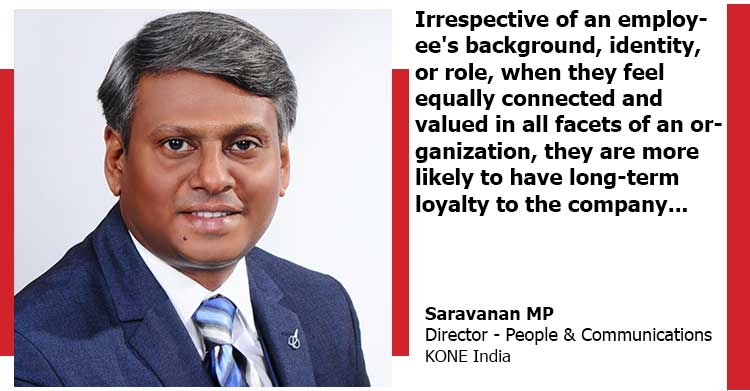Creating a Culture of Inclusivity: HR’s Role in Diversity Initiatives | Saravanan MP | Director- People & Communications | KONE India

Even though employee policies, engagement programs, and other relevant initiatives are essential for an organization’s effective functioning, employers who prioritize equality by addressing the diverse workforce’s unique needs, perspectives, and potential are well-armed to outperform their competitors. As a result, workplaces that embrace diversity and inclusivity frequently cultivate a culture of strong employee commitment and trust, leading to greater organizational growth. According to a Harvard Business Review report, innovative businesses with a diverse workforce bring in 19% greater revenue.
Irrespective of an employee’s background, identity, or role, when they feel equally connected and valued in all facets of an organization, they are more likely to have long-term loyalty to the company. Be it the millennial generation, which is projected to constitute 75% of the workforce by 2025 according to Deloitte, or older employees and women, organizations that foster inclusivity are better positioned to retain top talent and attract the brightest individuals.
Ensuring diversity and inclusivity in an organization, HR plays a vital role in shaping and implementing effective initiatives. Such initiatives work wonders in empowering employees to contribute their unique perspectives, ultimately driving innovation and success, while making employees feel valued and appreciated.
The significance of HR in developing a culture of inclusivity
Launching inclusive policies: In the end, employees are the backbone of any thriving organization. When employees are exposed to a work setting that promotes inclusivity and diversity, it enhances their sense of value and positively impacts their productivity. Thus, in order to encourage a culture of inclusivity, it is crucial for HR professionals to launch fair, impartial and inclusive policies that consider the distinct needs and challenges of all employees. Consequently, such policies will make employees feel valued and motivated, impacting their overall performance and productivity.
Inclusive recruitment strategies: In today’s competitive market, a diverse team with various talents and abilities is crucial for a company’s growth and success. Developing inclusive job descriptions and marketing tactics that appeal to a wide range of candidates, HR partners play a crucial part in ensuring diversity in the workplace. In addition, by implementing blind recruitment techniques and addressing unconscious biases, HR can establish a fair and unbiased evaluation process, attracting diverse personnel while cultivating a more inclusive and equitable recruitment process.
Diversity and inclusion training: Having a diverse workforce population in an organization is not enough, it is crucial for employees to feel included and appreciated. Historically, it has been challenging for organizations to implement programs that genuinely improve each employee’s sense of inclusion and belonging in their everyday interactions. However, modern-day organizations with competent HR departments recognize diversity and inclusion training as an essential component in ensuring organizational success. By planning robust inclusion training programs and activities, HR aids employees in recognizing the value of diversity, cultivating empathy, and encouraging polite interaction.
Fostering a diverse and inclusive workforce!
Fostering a diverse and inclusive workforce is crucial in today’s modern workplace, where employees expect more than basic organizational practices. In addition to losing valuable employees, companies that fail to create a fair workplace run the danger of producing lower profits and lagging behind their rivals.
Establishing diversity and inclusion allows business leaders to leverage their workforce’s unique traits and pave the way for growth and development. And leaders who consider a two-dimensional approach to diversity and inclusion when building diverse workplaces, encompassing both inherent and acquired diversity, are more likely to experience growth. According to an HBR study, 2-D diverse organizations have a higher chance of expanding their market share (45%) and entering new markets (70%).
Thus, it is safe to assert that an inclusive work environment can only be accomplished when leaders promote positive behaviours such as camaraderie, empathy, appreciation, and inclusion within their organization.


